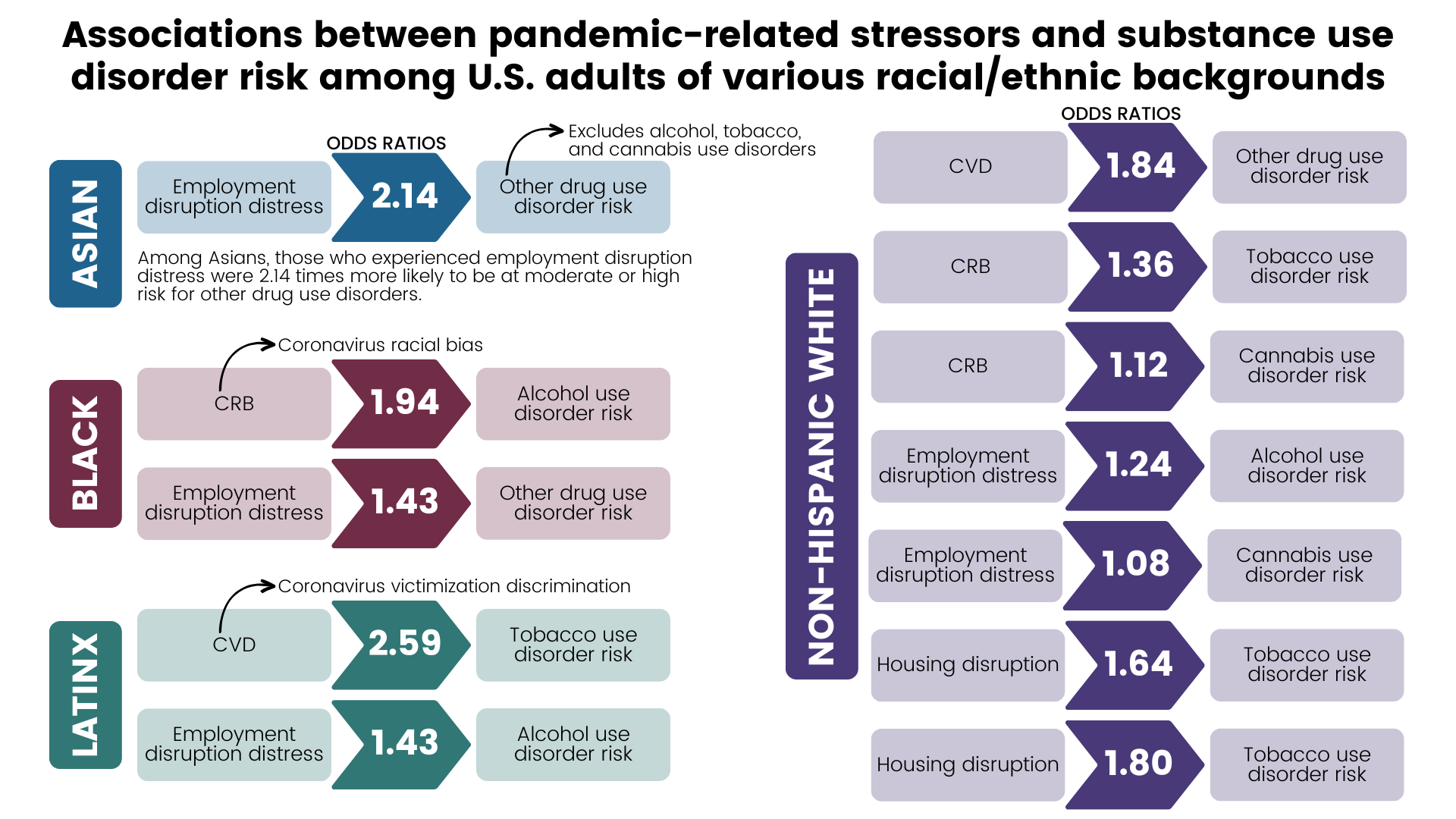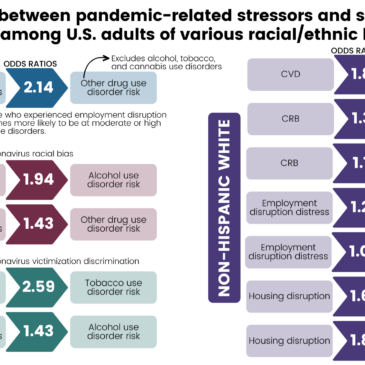Racially minoritized people have been disproportionately impacted by the COVID-19 pandemic. Stressors such as employment changes, housing disruptions, and COVID-19-related racial discrimination may contribute to increased substance use among racially minoritized people. This week, STASH reviews a study by Xiangyu Tao and colleagues that examined the associations between pandemic-related stressors and substance use disorder (SUD) risk among adults of various racial/ethnic backgrounds in the United States.
What was the research question?
What are the associations between pandemic-related stressors and SUD risk among Asian, Black, Latinx, and non-Hispanic White adults in the United States?
What did the researchers do?
Over 1,330 U.S. residents who self-identified as Asian (8.53%), Black (10.55%), Latinx (10.93%), or non-Hispanic White (69.99%) participated in the study from December 2020 to June 2021. Participants reported whether they had experienced the following pandemic-related stressors: employment disruption distress, housing disruption, Coronavirus victimization distress,1 and Coronavirus racial bias.2 Participants also completed the Alcohol, Smoking, and Substance Involvement Screening Test (ASSIST) for the previous 30 days, which was used to calculate SUD risk level (lower, moderate, or high). The researchers then conducted logistic regression analyses to find associations between pandemic-related stressors and SUD risk for each racial/ethnic group.
What did they find?
Among Asian adults, those who reported experiencing employment disruption distress had a higher likelihood of being at moderate to high risk for a drug use disorder other than alcohol, tobacco, and cannabis. Among Black adults, Coronavirus racial bias and employment disruption distress were associated with higher odds of alcohol use disorder risk and other drug use risk, respectively. Among Latinx adults, those who reported experiencing Coronavirus victimization distress were more likely to be at moderate to high risk for tobacco use disorder, and those with employment disruption distress were at higher risk for an alcohol use disorder. Among non-Hispanic White adults, there were multiple associations between pandemic-related stressors and SUD risk (see Figure).

Figure. Statistically significant associations between pandemic-related stressors and SUD risk among Asian, Black, Latinx, and non-Hispanic White adults. Odds ratios were adjusted to account for age, gender, household income, education, and COVID-19 health risk. Click image to enlarge.
Why do these findings matter?
The impact of the COVID-19 pandemic is not uniform across all populations. Although substance use is a common coping strategy for COVID-19-related stress, racial/ethnic groups may have culturally-specific risk factors and drug preferences. Thus, there is a need for culturally-specific interventions that are developed in partnership with communities and tailored to each population. For example, Drum-Assisted Recovery Therapy integrates Native American drumming, singing, and talking circles into SUD treatment for American Indian/Alaska Native individuals and might promote healthy ways to cope with stress caused by the pandemic or other destabilizing events.
Every study has limitations. What are the limitations in this study?
The researchers recruited participants through Facebook, so the results may not be generalizable to non-Facebook users or those who do not have access to the Internet.
For more information:
If you are worried that you or someone you know is experiencing addiction, the SAMHSA National Helpline is a free treatment and information service available 24/7. Substance use resources specific to COVID-19-related concerns can be found at the National Institute on Drug Abuse. For more details about addiction, visit our Addiction Resources page.
— Caitlyn Matykiewicz, MPH
What do you think? Please use the comment link below to provide feedback on this article.
________________
[1] Coronavirus victimization distress refers to a participant’s experience of being teased or bullied, physically threatened, mistreated, verbally taunted or called bad names, or cyberbullied because someone thought the participant had COVID-19.
[2] Coronavirus racial bias refers to a participant’s beliefs about how the coronavirus is negatively affecting societal attitudes toward one’s race/ethnicity.




